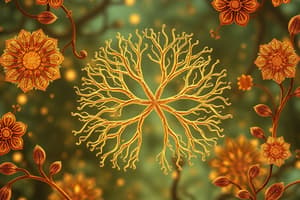Podcast
Questions and Answers
What characterizes an isotonic solution in relation to mammal cells?
What characterizes an isotonic solution in relation to mammal cells?
- Equal concentration of solute and solvent inside and outside the cell (correct)
- No movement of water into or out of the cell (correct)
- More solute concentration outside the cell
- Higher water potential inside the cell
What is the primary end product of photosynthesis?
What is the primary end product of photosynthesis?
- Water
- Carbon Dioxide
- Oxygen
- Glucose (correct)
Which of the following processes occurs first during aerobic cellular respiration?
Which of the following processes occurs first during aerobic cellular respiration?
- Krebs cycle
- Electron transport chain
- Fermentation
- Glycolysis (correct)
What is the primary function of enzymes in biological processes?
What is the primary function of enzymes in biological processes?
What does the term 'haploid' refer to in genetics?
What does the term 'haploid' refer to in genetics?
In which part of the plant cell do the light-dependent reactions of photosynthesis occur?
In which part of the plant cell do the light-dependent reactions of photosynthesis occur?
What are plasmids in the context of transgenic organisms?
What are plasmids in the context of transgenic organisms?
Which process represents the stage of cell division where chromosomes are separated towards opposite poles?
Which process represents the stage of cell division where chromosomes are separated towards opposite poles?
Flashcards
Classifying Organisms
Classifying Organisms
The process of grouping organisms based on shared characteristics. This helps us understand the diversity of life and evolutionary relationships.
Hypotonic Solution
Hypotonic Solution
A solution with a lower concentration of solutes compared to the cell. Water moves into the cell, causing it to swell.
Photosynthesis
Photosynthesis
The process where plants use sunlight, water, and carbon dioxide to create glucose (sugar) and oxygen. It's the foundation of food chains and energy flow on Earth.
ATP
ATP
Signup and view all the flashcards
What is the purpose of mitosis?
What is the purpose of mitosis?
Signup and view all the flashcards
What is the difference between haploid and diploid?
What is the difference between haploid and diploid?
Signup and view all the flashcards
Define dominant and recessive alleles.
Define dominant and recessive alleles.
Signup and view all the flashcards
What are transgenic organisms?
What are transgenic organisms?
Signup and view all the flashcards
What is natural selection?
What is natural selection?
Signup and view all the flashcards
Explain the difference between adaptation and evolution.
Explain the difference between adaptation and evolution.
Signup and view all the flashcards
Define transcription and translation.
Define transcription and translation.
Signup and view all the flashcards
What are the main differences between aerobic and anaerobic cellular respiration?
What are the main differences between aerobic and anaerobic cellular respiration?
Signup and view all the flashcards
Study Notes
Biology 101 Final Study Guide
-
Life Classification and Basic Chemistry: Understand the characteristics of life; know atomic weight, atomic number, structure; understand chemical concepts (pH, acids, bases, water properties).
-
Organic Molecules: Understand carbohydrates, proteins, nucleic acids, and enzymes. Define ATP structure and function.
-
Cellular Metabolism: Define and differentiate diffusion, osmosis, active and facilitated transport. Describe the impact of hypotonic, isotonic, and hypertonic solutions on plant and animal cells.
-
Photosynthesis and Cellular Respiration: Understand photosynthesis processes, location within the cell, and products of the process. Understand aerobic respiration processes, locations within the cell, end products, and effects of oxygen limitation.
-
Cell Division: Define and differentiate between mitosis and meiosis. Understand the purpose and end result of each process. Know the stages of cell division.
-
Genetics: Define important genetic terms: haploid, diploid, dominant, recessive, heterozygous, homozygous, allele, genotype, phenotype. Understand genetics problems (single-trait crosses, two-trait crosses, incomplete dominance, sex-linked traits, blood typing). Recognize chromosomal abnormalities (Trisomy, autosomal recessive/dominant disorders, sex chromosome disorders).
-
DNA and RNA: Understand the structure of DNA and RNA, the nucleotides, complementary base pairing, and semiconservative replication. Define transcription and translation.
-
Transgenic Organisms: Understand what plasmids are and how they are used to develop transgenic organisms.
-
Evolution: Be familiar with evolutionary concepts like natural selection, adaptation, genetic drift, gene flow, directional selection, founder effect, bottleneck effect. Understand the Hardy-Weinberg law and conditions.
-
Population Ecology: Understand population definitions, such as carrying capacity, birth rate, growth rate, exponential growth, biotic potential, and the difference between normal and exponential growth curves (S-curves versus J-curves).
-
Ecology Concepts: Define ecology terms like autotrophs, heterotrophs, producers, consumers, density-dependent and independent factors, and energy flow through ecosystems. Understand pyramids of energy and biomass, biological magnification, and ecological succession.
-
Biomes: Understand the basic characteristics of terrestrial and aquatic biomes.
Studying That Suits You
Use AI to generate personalized quizzes and flashcards to suit your learning preferences.




